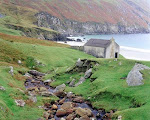US carmakers deserve to fold having lost the plot decades ago. The Big 3, Chrysler, GM and Ford could have produced these cars and be on top - if they didn't have their collective heads up their corporate arses. And they have the cheek to ask for bailout money. Guess it's another case of American know-how - yep - know-how to bankrupt the US economy. Good work lads.
VW - 2 passenger car - 258 mpg
 Source
SourceThis is not a toy, not a concept car. It is a newly developed 2-seater car in highly aerodynamic tear-shape road-proven real car. It is ready to be launched as a single-seater for sale in Shanghai in 2010 for a mere RMB 4,000 = US $600 .00 ! Interested? Wait till you learn that it will cruise at 100-120 Km/Hr with an unbelievable 0.99litre/100Km =(258 miles/gallon) !! Impressed? Totally, after you have read all the details below about the hi-tech and space-age material input into this care !!! Truly the most Economic Car in the world . Must see and read to the end and please comment !!!! The Most Economic Car in the World will be on sale next year....
Tata Nano from India

Source
The Tata Nano is a rear-engined, four-passenger city car built by Tata Motors, aimed primarily at the Indian market. It was first presented at the 9th annual Auto Expo on 10 January 2008, at Pragati Maidan in New Delhi, India.
Tata Motors commercially launched Nano on March 23, 2009, with bookings from April 9 to April 25.The sales of the car will begin in July 2009, with a starting price of Rs 1,15,000 Rupees, cheaper than the Maruti 800, its main competitor and next cheapest Indian car priced at 1,84,641 Rupees. It also has an 8 percent smaller exterior size and a 23 percent larger interior space compared to Maruti 800. Tata had sought to produce the least expensive production car in the world — aiming for a starting price of Rs.1,00,000 (approximately US$2,000 in March 2009).
In early 2008 the news magazine Newsweek identified the Nano as a part of a "new breed of 21st-century cars" that embody "a contrarian philosophy of smaller, lighter, cheaper" and portend a new era in inexpensive personal transportation — and potentially, "global gridlock" The Wall Street Journal confirmed a global trend toward small cars, which includes the Nano.
"Nano" means "small" in Gujarati, the language of the founders of the Tata Group. In English, the prefix "nano-" is often used to mean small. This derives from the Greek root 'nanos', meaning dwarf.




















